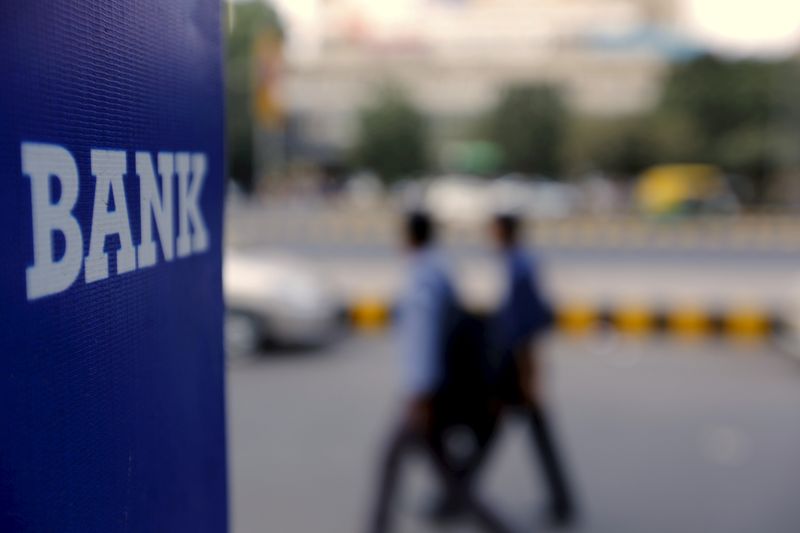By Michelle Price and Sumeet Chatterjee
WASHINGTON/HONG KONG (Reuters) - Faced with an unprecedented level of sanctions on Russia, global banks are taking a dim view of business with all Russian entities and dropping clients if there is even a slight doubt on their ties to that country, said bankers and lawyers.
Over the past week, the United States, Canada, Britain and European allies have imposed a raft of sanctions on Russia in retaliation for its invasion of Ukraine, with Australia, Japan, Singapore, Taiwan and South Korea also introducing restrictions.
The sanctions target multiple wealthy Russian elites, several major Russian banks, state entities and dozens of their subsidiaries, and some Russian banks' access to the international SWIFT messaging service, among other curbs.
While global banks have extensive experience with sanctions and have invested billions of dollars in compliance programs in recent years, the curbs on Russia are unmatched in their scale, speed and complexity and may yet grow, said executives.
To avoid falling foul of the rules and having assets and capital ensnared by new curbs, banks are adopting extreme caution in all of their dealings with Russian entities, actions that will likely exacerbate global trade disruptions, said bankers and lawyers.
A senior Hong Kong-based Asia trade finance banker with a global lender said his compliance colleagues are asking more questions even if a financing deal involves a non-sanctioned Russian entity, directly or indirectly.
In India, for example, which has not imposed sanctions on Russia with which it has strong trade ties, the banker said his firm had become "very, very cautious" about deals involving Russian firms, fearing Indian institutions getting caught in so-called secondary sanctions.
Another senior banker at a large Asian bank said his firm was looking into whether they have enough compliance staff and technology to run checks on various sanctions imposed on Russia and whether they will be able to flag potentially risky deals.
"It's not just managing risk from the existing sanctions, but also thinking about what more could possibly happen on that front," said the banker. "No one would like to sign a billion dollar trade finance deal only to be told a week later that the entity in Russia has also been added to the sanction list."
Both the bankers and their peers declined to be named due to sensitivity of the matter.
"Banks generally, and certainly the global banks, often tend to be very cautious and conservative with respect to sanctions, especially U.S. sanctions," said Charlie Steele, partner at Washington-based consultancy Forensic Risk Alliance and a former U.S. Treasury Department sanctions attorney.
"There will be a high level of de-risking in this situation, given the very high priority that governments – including but not only the U.S. – are putting on these sanctions."
'SELF-SANCTION'
Banks have already begun to act.
Societe Generale (OTC:SCGLY) SA and Credit Suisse (SIX:CSGN) Group AG have stopped financing commodities trading from Russia, Bloomberg reported on Sunday.
State Bank of India, the country's top lender, will not process any transactions involving Russian entities subject to international sanctions imposed on Russia, Reuters reported on Monday.
And even before Western allies unveiled their most severe sanctions over the weekend, major buyers of Russian oil were struggling to secure letters of credit from Western banks due to the market uncertainty, Reuters reported last week.
"In time, other banks may well 'self-sanction' given the risks involved," Simon MacAdam, senior global economist, at Capital Economics wrote in a research note on Tuesday.
The exposure to Russia so far disclosed by Western banks appears to be fairly modest.
U.S. banks have an exposure of $14.7 billion, and Italian, French and Austrian banks' combined have an exposure of over $42.5 billion. Citigroup (NYSE:C) said this week its total exposure was nearly $10 billion.
It is the speed at which sanctions could be widened, however, that is the top concern for banks.
Executives fear Western curbs on Russia may follow those on Iran, which was eventually subject to "secondary sanctions" - restrictions on any entity that does U.S. dollar business with the underlying sanctioned entity.
That would dramatically expand the number of restricted entities. And for bankers based in countries that have yet to jump on the sanctions bandwagon, the risk they might pose is another worry.
Under U.S. sanctions, an entity that is 50% owned or more, directly or indirectly, by one or more blocked persons is itself also considered blocked, whether or not it is on the sanctions list.

And with so many jurisdictions issuing sanctions, some of which differ, compliance teams are having to screen for exposure to sanctioned entities at multiple layers of the group, including the bank holding company, regional subsidiaries, local branches and other corporate vehicles, said bankers and lawyers.
"This multifactor murkiness creates uncertainty in the system which is frankly an impediment to ordinary commerce taking place," said Jeff Cottle, partner at law firm Brown Rudnick specializing in compliance and white collar crime.